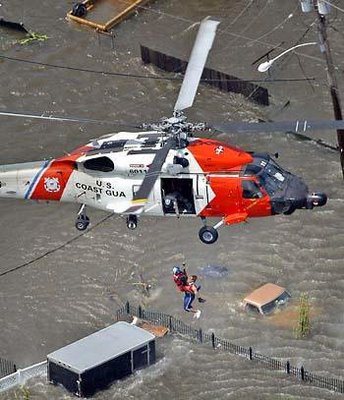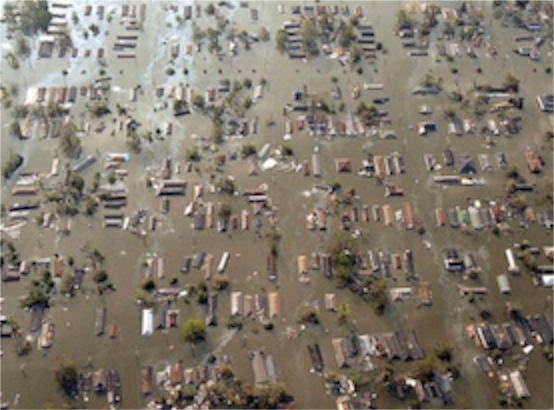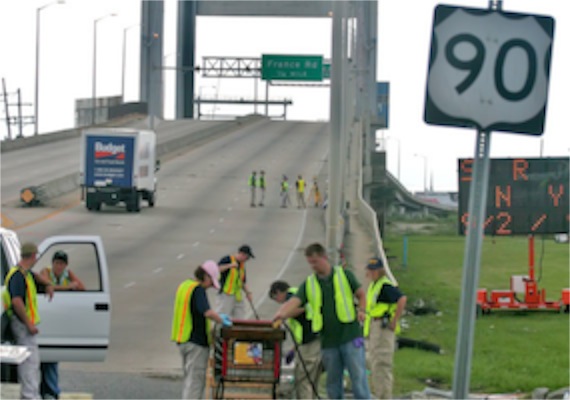When Society Breaks Down
05/04/12 04:59
We have grown used to stories about society breaking down in distant places. We know stories of injustices perpetrated in Northern Ireland, in the Middle East and in Sub-Saharan Africa. We have seen videos of chaos that can occur in distant locations. In a sense we are no longer shocked when we hear reports of brutality and the claiming of innocent victims.
But there has been some sense that those are stories of events that occur to other people in other places. We have felt ourselves immune to such things. We take comfort in our constitution and system of laws that protect us. We feel that we have recourse to justice through a court system.
All of that changed in August, 2005, when Hurricane Katrina battered the gulf coast and society totally broke down in New Orleans. Local, state, and federal governments were unprepared and unable to deal with the situation and the rest of us looked on with horror as people suffered not only from the devastation of the storm, but from the dysfunction of the government that should have been there to help them.
 There were a lot of dynamics that contributed to a complex series of tragedies. One factor was the fear that gripped our entire nation following the terrorist attacks of September 11, 2001. The federal government had engaged in a complete re-thinking of security measures and the new Homeland Security system was being put into place, including a lot of federal funding going to local law enforcement agencies without a clear sense of the role of local agencies in providing security. The concept of a war on terror was diffuse. Instead of the enemy being a nation, it was a particular tactic. In a sense everyone was suspect. Those with names or physical appearance that connected them with the Middle East were even more suspect. Muslim Americans found their nationality and religion suspect. Fear can be dangerous and there was plenty of fear in our country.
There were a lot of dynamics that contributed to a complex series of tragedies. One factor was the fear that gripped our entire nation following the terrorist attacks of September 11, 2001. The federal government had engaged in a complete re-thinking of security measures and the new Homeland Security system was being put into place, including a lot of federal funding going to local law enforcement agencies without a clear sense of the role of local agencies in providing security. The concept of a war on terror was diffuse. Instead of the enemy being a nation, it was a particular tactic. In a sense everyone was suspect. Those with names or physical appearance that connected them with the Middle East were even more suspect. Muslim Americans found their nationality and religion suspect. Fear can be dangerous and there was plenty of fear in our country.
When you expect the threat to be a small cell of people bent on maximum destruction, you don’t pay enough attention to the stability of sea walls and levees. When you are looking for explosives smuggled into crowded places, you might not pay attention to the weather reports.
Whatever the dynamics, after the storm raged through the Gulf States, people found themselves to be abandoned by their own government. To make matters worse, government officials went way beyond abandonment, they actively engaged in victimizing hurricane survivors. We don’t know all of the stories, but what we have heard is horrifying.
 Patricia Thompson was trapped in the city with her family. Authorities with guns drawn prevented her from crossing the Crescent City Bridge to reach her sister. Later, soldiers trained their guns on her six-year-old granddaughter’s forehead, threatening to kill her if she moved.
Patricia Thompson was trapped in the city with her family. Authorities with guns drawn prevented her from crossing the Crescent City Bridge to reach her sister. Later, soldiers trained their guns on her six-year-old granddaughter’s forehead, threatening to kill her if she moved.
Dan Bright was arrested on false charges and held in Orleans Parish Prison. As the storm came, guards abandoned the building, leaving Bright and his fellow inmates to break out of their cells in order to save their lives.
Father Vien The Nguyen stayed behind to fend for parishioners who could not evacuate. As the days wore on and their supplies dwindled, help was nowhere to be found.
Rhonda Sylvester floated her grandchildren in buckets through miles of filthy floodwater, searching for rescuers. Buses meant to take them to safety eventually moved them to a highway where they languished for days without any supplies.
Abdulrahman Zeitoun, a Syrian-American, traveled the flooded city in his canoe, helping those in need. A week after the storm he was arrested under suspicion of terrorism and detained for weeks without charges or any family contact.
There are a lot more stories like those. 17-year-old James Brissette and 40-year-old Ronald Madison, who were both unarmed, were killed and four others were wounded on September 4, less than a week after the storm passed New Orleans. They were gunned down by police officers. To cover up the killings, police planted a gun, fabricated witnesses and falsified reports. Yesterday U.S. District Judge Kurt Englehardt handed down sentences to four former police officers.
What is more striking than the sentences is the frustration that the judge expressed in the judge’s two-hour speech criticizing the case put together by the prosecutors. He said he was “astonished and deeply troubled” by the plea deals with cooperating witnesses at the heart of the government’s case.
 Police officers testified that in the lawlessness that followed the storm, they feared for their lives. That may be true. There was looting that followed the storm – some of it was a desperate attempt to obtain food and other survival supplies. But police storming out of a budget rental truck commandeered for their own use weren’t following the law, either. Storming a group of unarmed civilians seeking shelter on the Danziger Bridge in the city’s Gentilly area is hardly responding to a threat. Running down and shooting in the back a mentally disabled man and then stomping and kicking his body is not explained by the fear the officers felt. Tampering with evidence, planting false evidence, and weaving a web of lies to cover up the shootings should not be standard procedure for trained officers.
Police officers testified that in the lawlessness that followed the storm, they feared for their lives. That may be true. There was looting that followed the storm – some of it was a desperate attempt to obtain food and other survival supplies. But police storming out of a budget rental truck commandeered for their own use weren’t following the law, either. Storming a group of unarmed civilians seeking shelter on the Danziger Bridge in the city’s Gentilly area is hardly responding to a threat. Running down and shooting in the back a mentally disabled man and then stomping and kicking his body is not explained by the fear the officers felt. Tampering with evidence, planting false evidence, and weaving a web of lies to cover up the shootings should not be standard procedure for trained officers.
There is a difference between fear and paranoia. Paranoia is fear when no threat exists. It is a mental illness. Victims of paranoia shouldn’t be uniformed and armed. The failure of the system to properly train the officers is clear. Their failure of courage is hard to take. We expect more from law enforcement officers.
The case is far from over. There will be appeals. Those convicted will rightly claim that they weren’t the only ones involved and that others got off without punishment. The arguments will continue for years to come.
Also continuing will be the memory of what happened and the knowledge of how fragile our society and our system of laws really is. When disaster strikes, civility breaks down quickly.
It will be the job of our generation to carefully collect the stories and sift them for the truth of what happened. We must preserve these stories and pass them on to future generations. What happened in New Orleans should never happen again. Burying evidence and passing on the blame will not assist in efforts to prevent such incidents. What is needed is for the truth to be told.
But there has been some sense that those are stories of events that occur to other people in other places. We have felt ourselves immune to such things. We take comfort in our constitution and system of laws that protect us. We feel that we have recourse to justice through a court system.
All of that changed in August, 2005, when Hurricane Katrina battered the gulf coast and society totally broke down in New Orleans. Local, state, and federal governments were unprepared and unable to deal with the situation and the rest of us looked on with horror as people suffered not only from the devastation of the storm, but from the dysfunction of the government that should have been there to help them.

When you expect the threat to be a small cell of people bent on maximum destruction, you don’t pay enough attention to the stability of sea walls and levees. When you are looking for explosives smuggled into crowded places, you might not pay attention to the weather reports.
Whatever the dynamics, after the storm raged through the Gulf States, people found themselves to be abandoned by their own government. To make matters worse, government officials went way beyond abandonment, they actively engaged in victimizing hurricane survivors. We don’t know all of the stories, but what we have heard is horrifying.

Dan Bright was arrested on false charges and held in Orleans Parish Prison. As the storm came, guards abandoned the building, leaving Bright and his fellow inmates to break out of their cells in order to save their lives.
Father Vien The Nguyen stayed behind to fend for parishioners who could not evacuate. As the days wore on and their supplies dwindled, help was nowhere to be found.
Rhonda Sylvester floated her grandchildren in buckets through miles of filthy floodwater, searching for rescuers. Buses meant to take them to safety eventually moved them to a highway where they languished for days without any supplies.
Abdulrahman Zeitoun, a Syrian-American, traveled the flooded city in his canoe, helping those in need. A week after the storm he was arrested under suspicion of terrorism and detained for weeks without charges or any family contact.
There are a lot more stories like those. 17-year-old James Brissette and 40-year-old Ronald Madison, who were both unarmed, were killed and four others were wounded on September 4, less than a week after the storm passed New Orleans. They were gunned down by police officers. To cover up the killings, police planted a gun, fabricated witnesses and falsified reports. Yesterday U.S. District Judge Kurt Englehardt handed down sentences to four former police officers.
What is more striking than the sentences is the frustration that the judge expressed in the judge’s two-hour speech criticizing the case put together by the prosecutors. He said he was “astonished and deeply troubled” by the plea deals with cooperating witnesses at the heart of the government’s case.

There is a difference between fear and paranoia. Paranoia is fear when no threat exists. It is a mental illness. Victims of paranoia shouldn’t be uniformed and armed. The failure of the system to properly train the officers is clear. Their failure of courage is hard to take. We expect more from law enforcement officers.
The case is far from over. There will be appeals. Those convicted will rightly claim that they weren’t the only ones involved and that others got off without punishment. The arguments will continue for years to come.
Also continuing will be the memory of what happened and the knowledge of how fragile our society and our system of laws really is. When disaster strikes, civility breaks down quickly.
It will be the job of our generation to carefully collect the stories and sift them for the truth of what happened. We must preserve these stories and pass them on to future generations. What happened in New Orleans should never happen again. Burying evidence and passing on the blame will not assist in efforts to prevent such incidents. What is needed is for the truth to be told.